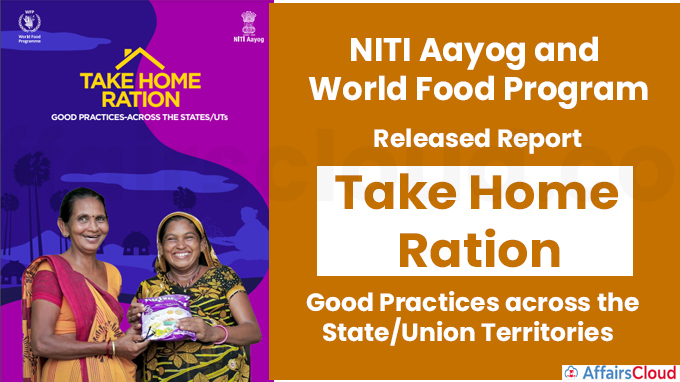
The National Institution for Transforming India (NITI) Aayog and the United Nations World Food Programme (WFP) have released a report titled “Take Home Ration: Good Practices-Across the States/UTs”. The report was released by Suman K. Bery, Vice Chairman of NITI Aayog.
- It highlights a collection of good and innovative practices used by the States and Union Territories (UTs) to implement the Take Home Ration (THR) value chain.
The report is based on secondary data sources and data obtained from the Department of Women and Child Development of various states/UTs.
Other Dignitaries
Dr. Vinod K. Paul, NITI Aayog Member (Health), Amitabh Kant, CEO of NITI Aayog, Indevar Pandey, Secretary, Ministry of Women and Child Development, Senior Advisor Rajib Sen, & Eric Kenefick, Deputy Country Director, United Nations WFP.
Background
The Government of India (GoI) launched the National Nutrition Mission (NNM), also known as the Prime Minister’s Overarching Scheme for Holistic Nourishment (POSHAN Abhiyaan), with the purpose of reducing undernutrition by 2% annually.
i. Recently, it has given the Supplementary Nutrition Programme (SNP) offered through the Integrated Child Development Services (ICDS) programme significant attention.
- ICDS is one of the largest child nutrition programmes in the world.
The SNP was created to bridge the nutritional gap among children under the age of six as well as pregnant and lactating women (PLW).
- It is distributed to over 9 crore beneficiaries registered at Anganwadi Centres (AWCs) in two ways: Hot-Cooked Meal (HCM) and Take-Home Ration (THR).
Note:
- To promote food and nutrition security and lower malnutrition levels, the GoI has various significant policy initiatives, schemes, and programmes in place, including the world’s largest food safety net under the National Food Security Act of 2013.
- The United Nations WFP in India mapped THR across India in 2019 and is currently supporting the state governments of Uttar Pradesh, Rajasthan, and Odisha in enhancing the composition and establishing decentralised production of fortified nutritious THR.
Take Home Ration (THR)
It offers fortified rations for use at home for pregnant and lactating women (PLW), and children between the ages of 6 and 36 months.
- The ‘first 1000 days’ window is of critical importance for ensuring full growth and development of children.
iii. The THR programme consumes a significant portion of the ICDS budget, with annual spending by the Central and State Governments exceeding Rs. 13,500 crore (about USD 2 billion).
This report is an effort to present the various steps taken to adopt in the implementation of the THR value chain, from formulations to last-mile delivery, by the States and UTs.Some of the improvisations are below
Procurement: This section highlights various good practices related to procurement adopted by various States and UTs. For instance, Delhi, Tamil Nadu, Telangana, Chandigarh, and Mizoram are procuring THR products through e-tendering for maintaining fair play and transparency.
Production model: Decentralized production model increases efficiency for lastmile delivery of THR to beneficiaries.
- In Kerala, Amrutham-Nutrimix THR is produced by WSHGs through a decentralized approach.
- In Karnataka, THR is produced by Mahila Supplementary Food Production Centers (MSPCs) led by Women Self-help groups.
Product formulation: The THR product must be healthful and nutritional ingredients.
- The YSR Sampoorna Poshana scheme in Andhra Pradesh provides milk and eggs. Beneficiaries in Haryana receive fortified sweetened flavored milk.
- The Andhra Pradesh, Chandigarh, Gujarat, Himachal Pradesh, Karnataka, Madhya Pradesh, Manipur, Mizoram, Odisha, Tamil Nadu, Telangana, and Uttarakhand are providing varied THR menu options to boost acceptability and provide additional choices among recipients.
Quality assurance and quality control: Gujarat has implemented inspections throughout the production process at the Amul THR factory to improve the quality of THR.
- Telangana has a quality control department that inspects the food. In Odisha, payments to WSHGs are withheld in the event of non-compliance with quality requirements, while in Rajasthan, the contract with the SHG is annulled.
Packaging and labelling: The THR packaging provides a good opportunity to share all information related to the THR product.
- In Odisha, color-coded packets are distributed, capturing key messages on the importance of breastfeeding.
- THR packets in Arunachal Pradesh, Gujarat, and Madhya Pradesh include instructions on product preparation.
Monitoring: It is critical to monitor its effectiveness of the programme. Jharkhand has adopted a real-time monitoring approach using call centres. In Odisha, community-level monitoring is institutionalized through the formation of Mothers Committees (MC) .
- In Himachal Pradesh, an Anganwadi-level Monitoring and Support Committee is formed comprising of members of Pachayati Raj Institution, SHGs, local teachers, and health workers for the purpose of monitoring.
Supply chain management: Supply chain management is an important component of the THR value chain. Odisha has adopted the Mo-Chhatua software application and management information system to streamline supply chain management.
Social and Behavior Change Communication (SBCC): For any initiative to have an impact, information, education and communication (IEC) play a pivotal role. Several state governments have designed IEC material showcasing the importance of THR. It includes flyers, flip-books, folk media campaigns, and digital platforms of IVR, and whats app chatbot
About National Institution for Transforming India (NITI) Aayog:
Chairperson – Narendra Modi, Prime Minister of India
CEO – Parameswaran Iyer
Established – 2015
Headquarters– New Delhi, Delhi




